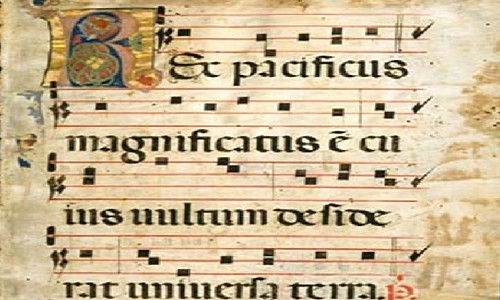Recovering epic labyrinth over 1,000 years
British researchers successfully restored the lost music of more than 1,000 years ago by finding the book disappeared for a century.
According to UPI, Sam Barrett, a researcher at the University of Cambridge, UK, thanks to the help of the trio of classical musicians to successfully restore many songs from the Middle Ages, a task that seemed impossible.
Hundreds of Latin songs recorded with medieval music symbols are called "neumes". This method of recording only highlights the melody line without accurately representing the low pitch of the note. To perform neumes, musicians need to know how to play traditional music that disappeared from the 12th century.

An example of medieval musical notation "neumes".(Photo: Ancient Origins).
"We only know the lines of the melody and how to express them, not the exact notes that make up the melody," Barrett said.
After studying ancient music theory, Barrett collaborated with the Sequentia (three members) group to get an idea of using musical instruments and re-expressing songs.
Barrett and Benjamin Bagby, co-founders of the Sequentia group, successfully restored the "Consolation of Philosophy" , an epic poem written by Roman philosopher Boethius. The Sequentia group performed the song on a small church at Pembroke College, England, on April 23.
The project could not have been successful if the research team did not find the lost book page from the collection of "Cambridge Songs" in the Latin song compiled in the 11th century. A German scholar tore this page in 1840 and it disappeared for more than a century. In 1982, the book was accidentally ripped off in the archives of the Frankfurt, Germany library.
"The symbols on the book disappeared and helped us complete the huge amount of repertoire of songs, something we couldn't do without it," Barrett said.
- Planet where people can live 150,000 years
- Mysterious aliens in epic Gilgamesh
- Mysterious labyrinth under Rome
- The ozone layer is gradually recovering
- Marvel new exotic planets in honeycomb clusters
- New discovery about the ancient temple Chavín de Huántar 3000 years in Peru
- 1-year time-lapse video passed on Earth from NASA's EPIC camera
- The mystery of treasure in the epic Homere.
- Nuclear war ever occurred prehistoric times?
- The ozone layer of the Earth is recovering
- The ozone layer is recovering after years of recession
- Indian officials claim the Internet was invented in curry!
 Discovered an ancient centipede fossil 99 million years old
Discovered an ancient centipede fossil 99 million years old Discovered bat-like dinosaurs in China
Discovered bat-like dinosaurs in China Discovered a 200-year-old bronze cannon of the coast
Discovered a 200-year-old bronze cannon of the coast Discover 305 million-year-old spider fossils
Discover 305 million-year-old spider fossils New discoveries on human sacrifice: Help strengthen power in a classifying society
New discoveries on human sacrifice: Help strengthen power in a classifying society  Discovering fossil 'mother and baby' 4,800 years in Taiwan
Discovering fossil 'mother and baby' 4,800 years in Taiwan  Braided hair may belong to the goddess in the coffin
Braided hair may belong to the goddess in the coffin  Discover treasure 600 kg of coins in Spanish park
Discover treasure 600 kg of coins in Spanish park  Found 4,000 year old deer horns on the beach
Found 4,000 year old deer horns on the beach  Detecting wrecks of adventurers eaten by aboriginal people
Detecting wrecks of adventurers eaten by aboriginal people 